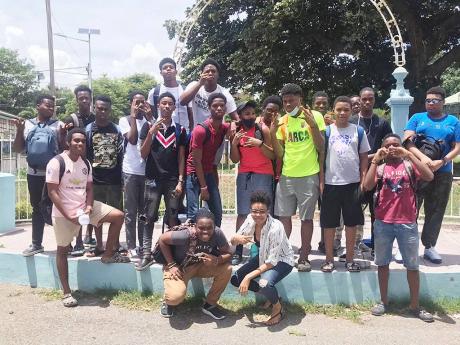25 tenth-graders ace CSEC maths
WESTERN BUREAU:
It’s not a myth that girls are outperforming boys in Jamaica, but for 25 determined tenth-graders at St George’s College in Kingston, that will never be the reality.
All 25 aced mathematics, attaining grade ones in the 2020 Caribbean Secondary Education Certificate exam as part of an accelerated programme coordinated by maths whiz Maliya Rabathaly-Llewellyn.
They will sit additional maths in fifth form, a historic feat at the 171-year-old Jesuit Catholic school created for boys.
Besides commending their parents for support, Rabathaly-Llewellyn credited the boys’ discipline, determination, and competitive edge for their success. The boys hail from a wide span of socio-economic circumstances, hailing from communities such as Tivoli Gardens and Franklyn Town.
“Where the students fell short, the parents pulled up the slack,” she told The Gleaner, revealing that at least one of the brilliant accelerators had no Internet access but was still able to hurdle that obstacle.
Her students concur.
Omar Bonny admitted that he was never a maths genius. In fact, he was failing maths before Rabathaly-Llewellyn’s intervention.
“She creates a comfortable environment, so we are not stressed, and we are encouraged to ask a lot of questions,” the 16-year-old said. “It is her style and method that got me this far because boys are easily distracted. Once you get us to focus, we are winners.”
Bonny also scored a grade one in English language. His classmate, Romario Wong, said the learning atmosphere and camaraderie, even outside of formal sessions, made the difference.
Wong said he was impressed with his “normal” 80-90 per cent average in maths before being selected for the programme, which started three years ago, but was pleased to reach new heights of 100 per cent.
JUST AS CAPABLE
St George’s principal Margaret Campbell is bullish about unlocking the potential of the 1,460 boys enrolled at the downtown Kingston school and feels that her young men are as capable as their female peers.
“If we engage in effective teaching, where we pay attention to the way they learn individually, it really does not become a gender issue,” Campbell said.
“The problem is, girls will learn in a boring class setting, while boys need a proper kind of classroom, which is why we are teaching in a creative way, engaging them in their own learning.”
Campbell created a stir when she became the first female principal of what was, historically, an all-boys institution. That was the same year St George’s ruffled feathers by starting to accept girls into its sixth-form programme.
Fourteen years later, Campbell, who was named LASCO Principal of the Year in 2018, says that St George’s has been paying significant attention to professional development, with particular focus on the boys.
Long before Campbell came to the helm, St George’s had a storied reputation of producing high-profile academics like Rhodes Scholars Ronald Thwaites and Trevor Munroe, business mogul Don Wehby, and Chief Justice Bryan Sykes.
However, the school’s chairman, Father Rohan Tulloch, says that the ‘Georgians’ don’t get as much recognition as they ought to. Perhaps that’s because St George’s is drowned out by the din of its noisy neighbours across the street, Kingston College.
“There are very few students at George’s who come out with less than five subjects,” Tulloch told The Gleaner, adding that the school’s English and maths grades for 2020 were 99 per cent and 92 per cent, respectively. “So pretty much everybody passed maths and English,” he said.
Tulloch said that over the last 14 years, St George’s has done well because of its targeted use of technology in teaching boys.
He said that while other schools awaited government instructions to go online, they were out the blocks early.
“We were training for online school long before the Government said we needed to start. For us, it’s about being proactive,” Tulloch added.

